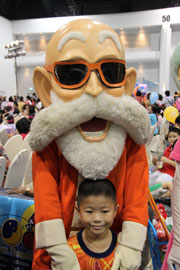Duck-noodle soup for the soul
Sea Write winner Montri Sriyong mixes his careful observations of the human condition for a rich broth of poetic satirePublished on September 3, 2007
The world is harsh, explains poet Montri Sriyong. "I am at war." In an interview with The Nation Montri, 39, says: "I have a good perspective on life, but I know the world has pain and all of us all have a sick soul. My therapy is writing poetry."
Montri has won a battle in his private war. He is the 2007 Sea Write Award winner for his "Loke Nai Duang Ta Kapajao" ("The World in My Eyes").
A Hat Yai duck-noodle soup vendor by profession, Montri's inspiration for the his poems came from days spent observing the empty, lonely lives of passers-by, most seemingly lost to any meaningful destiny. He wears glasses, suggesting in one poem that the fault in his vision means that only the "twisted, dark side of life" gets through. But even the sharpest mirror, he gloomily points out, will only reflect back two dimensions - there's no sign of anything like a human soul. And death and loss are just part of life.
At the end of his book, he sees a black future for the next generation, obsessed with their camcorders, addicted to a visual diet of sex and violence. And yet he's quick to defend himself against any charge of pessimism.
"Not therapeutic", is the terse verdict he gives on his childhood.
Waking everyday to the stench of alcohol, his pride took a beating helping his Chinese-born father sell noodles. He fought back physically and became a scrapper.
Montri got the chance to rebuild his young life in Bangkok at Ramkhamhaeng University, but only managed to get through two credits of his humanities and Thai language course. Ironically, he failed poetry - a class he rarely attended.
He switched to studying politics, but was summoned home not long into the course.
Another young dream was snuffed out, back home. "I wanted to be a district chief but never made it. I couldn't help my people that way," he says.
It was the May 1992 bloodbath that prompted him to submit some of his work to newspapers.
The events stirred him up so much that he started sending in pieces on political and social themes - and poems. He got his nickname "Kavi Mee Ped", or the duck-noodle poet, through a popular poem he wrote about the dish.
In other poems, Montri describes the waves of heartsickness that have hit him. Many of his friends and acquaintances have died. Pongsak, a friend of 20 years, burned up "living a life of extremes".
Women, many women, have been another source of heartbreak for the poet. But he writes, and he gets better. Poetry has changed his life and attitude.
Part of this poetic therapy took the form of writing about the daily grind of making duck-noodle soup. It was through this experience that he says he reached a kind of Nirvana, changing his attitude completely to what he'd previously thought of as a chore.
"Everybody has a will to search for goodness; but finding that goodness hangs on the efforts of the individual seeker," he says. Humans, he adds, are "precious, beautiful creatures".
Though he may have a tortured spirit, Montri's poetic self has found beauty in life. In one poem, he writes about a cowboy character who sells toys, bringing happiness to a whole village.
The cowboy moves on eventually, but the author says he still meets him in real life everyday.
Despite his record of heartbreak, Montri is today a happily married man.
Although he has come to terms with life as a duck-noodle soup seller, he believes he has a long way to go before achieving the same satisfaction in writing.
But writing is the battle he's chosen for himself in the war of life.
"Being a poet is a serious career, just like any other job. But you can't always write poetry; you also have to make money somehow," he says.
As well as the poetry, he's penned a short story called "Duck's Duck Manifesto: Ma Jag Ran Ped Siriwat" ("From Duck-Noodle Shop Siriwat"). A tale of the goings on around his shop, its satire on social conventions is partly inspired by Karl Marx's "Communist Manifesto".
Lisnaree Vichitsorasatra
The Nation

ปล. ใครช่วยแปลให้ผมหน่อยสิครับ
Relate topics
- บทสัมภาษณ์จากมหาวิทยาลัยแห่งหนึ่งของมาเลเซีย
- บทวิจาร์ณโลกในดวงตาข้าพเจ้า โดย สุภาพ พิมพ์ชน
- บทสัมภาษณ์ต่อปัญหาภาคใต้
- มี ก อ ง วั ส ดุ บ น ไ ห ล่ ท า ง
- การสร้างสรรค์วรรณกรรมในภาวะวิกฤติสังคมไทย: บทวิเคราะห์กรณีศึกษาจากการปฏิวัติอุตสาหกรรมในอังกฤษ,บ้านทรายทองและปีศาจ
- สุดดิน เพลงปลุกใจที่ยังอยู่ในความทรงจำ
- บทสัมภาษณ์ใน วารสารโรงเรียนนางรองพิทยาคม
- บทสัมภาษณ์ใน ศิลปวัฒนธรรม
- บทวิจาร์โลกในดวงตาข้าพเจ้า โดย ภาคย์ จินตนมัย
- บทสัมภาษณ์ในสกุลไทย
 นางฟ้าบนฟ้า
นางฟ้าบนฟ้า หญิง
หญิง ปภพ
ปภพ หมี่เป็ด ผู้ชายนัยน์ตาสนิมเหล็ก
หมี่เป็ด ผู้ชายนัยน์ตาสนิมเหล็ก